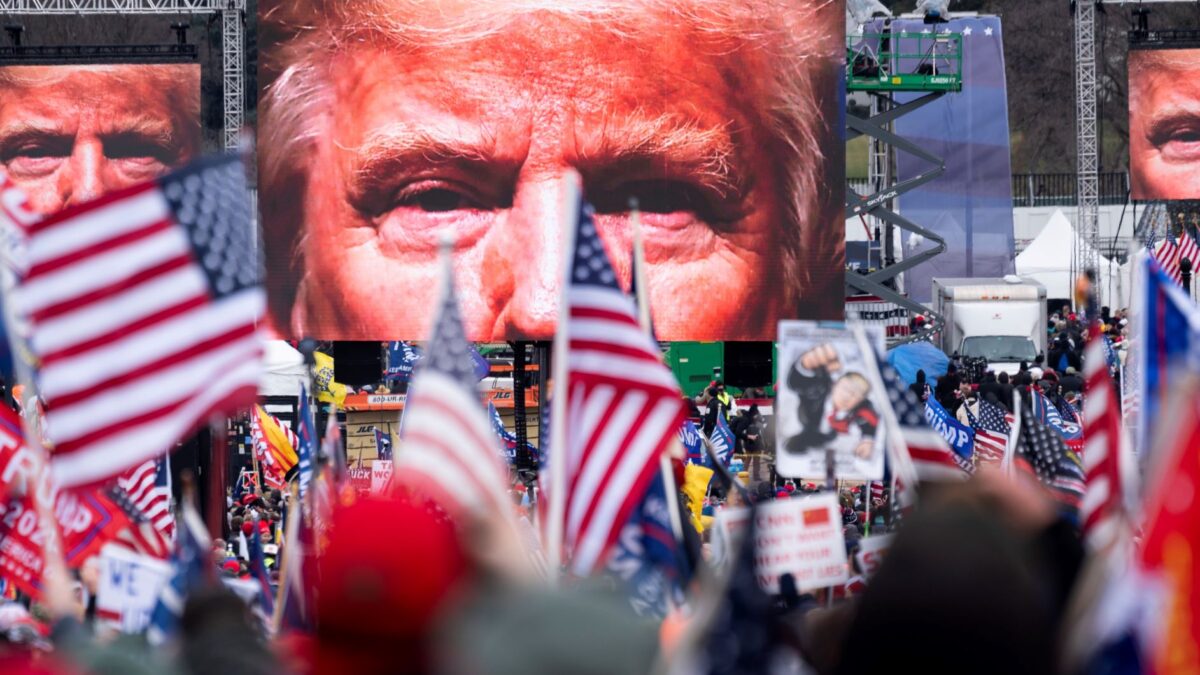Select Committee Plans Public Hearings in April –
Staff Report –
WASHINGTON, D.C. — The House select committee investigating the Jan. 6 attack on the U.S. Capitol indicated for the first time on Wednesday that there was enough evidence to charge former President Donald Trump and some of his allies with conspiracy to commit fraud and obstruction of Congress by misleading the American people about the outcome of the 2020 election and conspiring to overturn the result.
In a court filing in a civil case in California, the committee’s lawyers for the first time laid out their theory of a potential criminal case against the former president, saying they had accumulated evidence demonstrating that Trump, the conservative lawyer John Eastman and other allies could potentially be charged with criminal violations including obstructing an official proceeding of Congress and conspiracy to defraud the American people, according to a story first reported by the New York Times.
The filing also indicated there was evidence that Trump’s repeated lies about the election being stolen amounted to common law fraud, a law with a lower standard of proof in civil cases, where the burden is a “preponderance of evidence.” In criminal fraud the standard is “beyond a reasonable doubt.”
The filing disclosed only limited new evidence, and the committee asked the judge in the civil case to review the relevant material behind closed doors. In asserting the potential for criminality, the committee largely relied on the extensive and detailed accounts already made public about actions of Trump and his allies to attempt keeping him in office as a dictator after his electoral defeat.
The committee added information from its more than 550 interviews with state officials, Justice Department officials and top aides to Trump, among others.
It said, for example, that Jason Miller, Trump’s senior campaign adviser, had told the committee in a deposition that Trump had been told soon after Election Day by a campaign data expert “in pretty blunt terms” that he was going to lose, suggesting that Trump was well aware that his months of assertions about a stolen election were false. Trump subsequently said he disagreed with the data expert’s analysis, Miller said, because he thought he could win in court since he appointed the judges and justices.
The evidence gathered and presented by the committee “provides, at minimum, a good-faith basis for concluding that President Trump has violated” the obstruction count. The brief was written by Douglas N. Letter, the general counsel of the House, and said: “The select committee also has a good-faith basis for concluding that the president and members of his campaign engaged in a criminal conspiracy to defraud the United States.”
The brief said that a “review of the materials may reveal that the president and members of his campaign engaged in common law fraud in connection with their efforts to overturn the 2020 election results.”
Representatives of Trump did not respond to requests for comment.
But Mississippi Democrat Bennie Thompson, chair of the select committee, told reporters on Capitol Hill that he plans to hold public hearings in April to address just how Trump came to interfere with the joint session of Congress through rhetoric he knew to be false or unlawful. Public hearings would serve as an opportunity to cast a light on Trump’s secret efforts to overturn the election, from his attempts to pressure the then vice-president, Mike Pence, to return him to office, to abuse of the justice department.
“We want to paint a picture as clear as possible as to what occurred,” Thompson said. “The public needs to know what to think. We just have to show clearly what happened on January 6.”
Thompson said that the select committee has witnesses who have volunteered to testify before the panel in public hearings, though he did not specify whether they included former Trump administration officials or Capitol attack rioters who had been charged.
Charles Burnham, a lawyer for Eastman, said that his client, like all lawyers, “has a responsibility to protect client confidences, even at great personal risk and expense.”
“The select committee has responded to Dr. Eastman’s efforts to discharge this responsibility by accusing him of criminal conduct,” Burnham said in a statement. “Because this is a civil matter, Dr. Eastman will not have the benefit of the constitutional protections normally afforded to those accused by their government of criminal conduct. Nonetheless, we look forward to responding in due course.”
The select committee, which is controlled by Democrats but has Republican members appointed by House Speaker Nancy Pelosi, has no authority to charge anyone with a crime.
But the filing contains the clearest indication yet about the committee’s direction as it weighs making a criminal referral to the Justice Department against Trump and his allies, a step that could put pressure on Attorney General Merrick Garland to take up the case. The Justice Department has said little of substance about whether it is investigating Trump or might ultimately pursue a case, although the DOJ has charged former Trump aide Steve Bannon with contempt of Congress and his trial is expected to proceed this summer.
The filing laid out a sweeping if by now well-established account of the plot to overturn the election, which included false claims of election fraud, plans to put forward pro-Trump “alternate” electors, pressure various federal agencies to find irregularities and ultimately push Vice President Mike Pence and Congress to exploit the Electoral Count Act to keep a losing president in power.
“As the president and his associates propagated dangerous misinformation to the public (Eastman) was a leader in a related effort to persuade state officials to alter their election results based on these same fraudulent claims.” Letter wrote in the brief.
The court filing stemmed from a lawsuit filed by Eastman. Himself, who is trying to persuade a judge to block the committee’s subpoena for documents in his possession, claiming “a highly partisan” invasion of his privacy. The committee issued a subpoena to Eastman in January, citing a memo he wrote laying out how Trump could use the vice president and Congress to try to invalidate the 2020 election results.
As part of the suit, Eastman sought to shield from release documents he said were covered by attorney-client privilege. In response, the committee argued — under the legal theory known as the crime-fraud exception — that the privilege does not cover information conveyed from a client to a lawyer if it was part of furthering or concealing a crime.
Eastman argued the committee had offered “no evidence” of the existence of a crime-fraud exception, prompting the committee’s latest filing.
“The evidence supports an inference that President Trump, plaintiff and several others entered into an agreement to defraud the United States by interfering with the election certification process, disseminating false information about election fraud, and pressuring state officials to alter state election results and federal officials to assist in that effort,” the brief states.
It also made reference to a recent ruling in a civil suit in Washington, D.C., in which Judge Amit P. Mehta of the Federal District Court found that it was “plausible to believe that the president entered into a conspiracy with the rioters on Jan. 6, 2021.”
“In addition to the legal effort to delay the certification, there is also evidence that the conspiracy extended to the rioters engaged in acts of violence at the Capitol,” according to the brief.
On Tuesday, the State Bar of California announced an investigation into Eastman over whether he engaged in conduct that violated California law and ethics rules.
Eastman’s memo to Trump suggested that Pence could reject electors from certain states. Eastman also participated in a briefing for nearly 300 state legislators, during which he told the group that it was their duty to “fix this, this egregious conduct, and make sure that we’re not putting in the White House some guy that didn’t get elected,” according to the committee.
He met with Trump and Pence to push his arguments, participated in a meeting of Trump advisers at the Willard hotel and spoke at the “Stop the Steal” rally on the Ellipse on Jan. 6, before the Capitol assault. As violence broke out, he sent a message blaming Pence for not going along with his plan.
As a mob was attacking the Capitol, chanting “Hang Mike Pence,” Eastman sent a hostile message to the vice president’s top lawyer, blaming Pence for the violence.
“The ‘siege’ is because YOU and your boss did not do what was necessary to allow this to be aired in a public way so that the American people can see for themselves what happened,” he wrote to Greg Jacob, Pence’s chief counsel.
In a recent filing in his suit, Eastman said Trump had retained him “because of his election law and constitutional expertise” in the fall of 2020 for “federal litigation matters in relation to the 2020 presidential general election, including election matters related to the Electoral College.”
On Sept. 3, 2020 — two months before Trump lost the election — Eastman was invited by the pro-Trump lawyer Cleta Mitchell to join an Election Integrity Working Group to begin preparing for anticipated post-election litigation. Eastman said Trump had asked Mitchell to undertake the effort in August.
The judge in the case has already denied a request from Eastman to shield nearly 19,000 emails from the committee, saying that congressional investigators have the authority to see the messages and that the First Amendment does not protect his communications. Eastman has so far turned over about 8,000 of the emails.
___
If you support truth in reporting with no paywall, and fearless writing with no popup ads or sponsored content, consider making a contribution today with GoFundMe or Patreon or PayPal.














